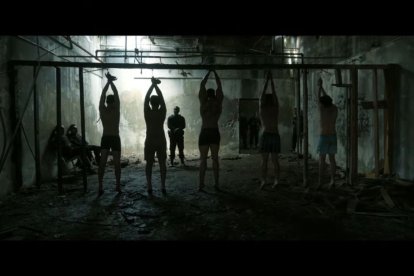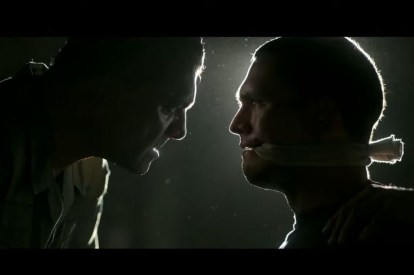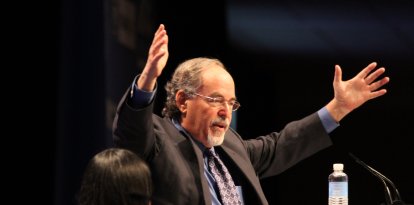Simón, the film that reminds us of the atrocities of the Nicolás Maduro dictatorship
We all endured the death of friends back in 2014 or 2017. We all have experienced exile, even some without having emigrated because our families are broken. The pain has not dissipated. We continue to be victims and the perpetrators continue to be in power.

Frame de la película Simón. | (Tráiler, YouTube)
At the end of the film, during the question and answer round, a young man from Valencia, Venezuela's second-largest city, stood up. With a broken voice, in front of more than 600 people, he said: "A friend was killed by the Bolivarian National Guard in 2017. Her mother couldn't stand it and took her own life. On the anniversary of her death, her father, already a widower, and without a daughter, also committed suicide."
-
"Simón," the debut feature by Venezuelan Diego Vicentini, is a tremendously well-made and well-told effort of collective therapy. It is a film that hurts, burns, and then haunts you. It doesn't leave you. It is the story of a young man, once a student leader, who endured the repression of the Venezuelan dictatorship and is now going through the trouble of seeking asylum in the United States. But it is much more than that. It is, at its core, a very complex story and difficult to digest.
I saw it a couple of days ago and I haven't stopped thinking about it since. I have to say that my first impression is that it exceeded expectations. I underestimated it. I thought it was going to be a glamorized effort to present, for the umpteenth time, what the 2017 protests and the repression were like in Venezuela at that time, which left more than 140 murdered by the dictatorship of Nicolás Maduro. But no. "Simón" is not like something we have already seen. Diego Vicentini's film is a pioneering act, not only in Venezuelan cinema but in our contemporary history—groundbreaking and necessary.
It is the first time that someone tells, as Vicentini did, a story so personal, so human, so sensitive and stark in the context of the anti-Chavista protests of 2017 or 2014. It is very personal, fortunately: it does not fall into the simplicity of, audiovisually, talking to us about the political situation in Venezuela as if it were some political blimp, that Maduro this, that Chávez that, it's socialism, it's the left or the right. No. In "Simón" none of that matters. In "Simón," only the emotions of those who lived, and suffered, this specific moment of repression and mourning matter.
So personal but, at the same time, so universal. Largely thanks to the fact that it does not come from an idealized portrayal. Because it is so human, a Nicaraguan, Chinese or Serbian dissident can relate to Simón. Or a young Syrian, Ukrainian or Cuban who has had to flee their home.

Simón, the film that reminds us of the cruelty of the Maduro regime
Frame from the movie Simón. | (Trailer, YouTube)
It is a film that hurts because, to the surprise of many, although this happened so long ago, the wounds are still open. Almost fresh, in fact. They have not healed. The flesh is exposed and "Simón" reminds us of it. And that's okay. Someone needed to do it.
We all endured the death of friends back in 2014 or 2017. We all have experienced exile, even some without having emigrated because our families are broken. The pain has not dissipated. We continue to be victims and the perpetrators continue to be in power.
"Simón" reminds us, based on Vicentini's commendable narrative achievement, that our history is more complex than the harmful Manichaeism to which some want to subject us. It's a game (or, rather, a business) and it's at a standstill. It seems that there is nothing more to do. But, although some have said that "Simon" is a defeatist work of art, that reminds us that the bad guys won, it does not have to be seen that way.
"Simón" is also a tribute to bravery and dignity, especially when cowardice and fragility are all that is left. "Simón" is a sensitive recognition of the struggle of millions, represented in individual stories, each saturated by their own storylines. To the mother who shot and killed her son in Francisco Fajardo. The one whose cousin did not survive the torture in prison. To the young man who lost his older brother, his hero, because one day he went out to protest, armed with a cardboard shield, and did not come home for dinner. Because they killed us, humiliated us and tortured us. And they are still there, killing and torturing. We cannot forget it.
"Simón" is not a defeatist story. On the contrary: it gives us hope. Because hope only exists if the memory does. Memories tell us that there is still a fight to fight, not only to recover our freedom but to demand justice. So that the sons of bitches who hurt us so much, have to pay. To allow the mothers who still mourn their children to know that one day there will be justice. That day will come. But, in the meantime, it is time to make a collective effort to remember why no one can give up. Because of that, "Simón" is essential.
We probably thought we had moved past it. That the deep pain we felt during those days when the tear gas surrounded us and the bullet casings hit the asphalt, was behind us. But no. We live with grief. And also with guilt, of course. That we did not save the country and that so much pain and so much loss and so much blood and prison and so much crying was of no use. It is an outstanding debt. The scars are still open and will only heal when we embrace each other, all of us, from wherever celebrate freedom.
RECOMMENDATION





















